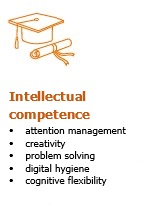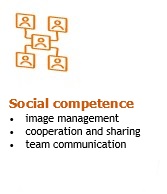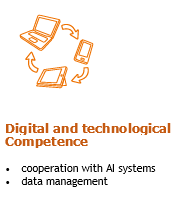The text is based on the Family of the Future report (Nationale Nederlanden).
The further digitization of our lives is inevitable. The most modern technologies already accompany us every day, and in twenty years’ time they will be our natural habitat not only among the younger age cohorts, but in the entire society. This year’s pandemic gave us a taste of how technology can make life easier and how we need it, forcing us to use solutions that we have not used as intensively thus far. These are not only facilitations. The development of digitalization also brings about various threats and challenges.
What will the future look like in 20 years time
- Digital matchmaking
In the past, the role of the matrimonial market was played by universities and the workplace, today it is becoming a standard to make friends on Internet forums or through a dating apps. In the United States, this is how 4 out of 10 relationships and every sixth marriage start. It is highly probable that the relationships “brought together by the algorithm” will be better suited and more rewarding, as it will be easier to match the preferences and expectations that the algorithms will provide.
- Family relationships – virtual co-presence
New communication technologies will connect people even better and more effectively. Contrary to their fears, smartphones and the Internet do not kill communication in a relationship: couples who communicate more often virtually communicate better, generally communicate better face-to-face. This phenomenon is known as communication coupling and also works the other way round: couples who cannot communicate effectively through a smartphone will also not be able to get along while sitting at one table.
Virtual co-presence and participation of family members who are geographically distant will become the standard. Newer and newer devices will allow us to better communicate our mood and emotions. We will know more about ourselves and we will be closer to each other than ever before.
The development of a culture based on digital content available online will make grandparents, parents and children watch the same TV shows, listen to similar music, use the same websites and social media. The space for shared experiences within the family will be expanded: younger and older generations will understand each other better, which will have a positive impact on the quality of relations between them.
Mutual technological socialization based on multi-directional and partnership development of digital competence will be strengthened within families. It is the grandchildren who will familiarize their grandparents with the new devices and their applications.
- More environmentally friendly consumption
Consumption will be more digital – we will borrow more than we own. In turn, everyday objects will be more durable and artificial intelligence will facilitate the reuse of materials.
- Optimizing everyday life
The algorithms will support our daily life in a wide range of ways: family responsibilities, budgeting. The Internet of Things will allow for the easier and more economical management of daily duties due to better control of financial flows.
A change in the nature of work will mean that we will have more time for ourselves. Remote work will become the standard, digital nomadism will spread – working from anywhere in the world. The linear nature of the professional career will lose its importance, we will change jobs more often.
We will increasingly work with artificial intelligence systems and intelligent robots: we will teach, service and develop machines. At the same time, intelligent systems and machines will increase human intellectual and physical capabilities. It is artificial intelligence that will integrate and analyze huge data sets, leaving the interpretation of the results to the human being. Progressive automation will make us mainly perform tasks that require creativity and those in which relationships with other human beings are important.
Cities will be increasingly smart, making it easier for us to live and move around in them (smaller traffic jams, optimized public transport, smart buildings and apartments).
- Digitization in health care
Artificial intelligence will provide us with better care.
Modern medical robots are increasingly being used to perform precise operations, also at a distance. Japan is testing compact humanoid robots that provide a substitute for social contacts for single seniors – they are also able to monitor their mental and physical condition.
However, the real breakthrough is the use of new technologies in preventative health care and diagnostics. With a new generation of intelligent devices capable of analyzing blood and urine at home, doctors will be able to quickly diagnose patients and give them virtual advice for more mundane diseases, such as seasonal colds in children.
Artificial intelligence identifies similarities between patient groups, allowing for the better matching of treatment plans.
Challenges and risks
- Datafication – i.e. the transfer of phenomena and processes into the digital sphere – and threats resulting from the unauthorized or harmful use of our data.
- Digital society and the digital economy will be managed by personalization. Consumers will expect products that perfectly meet their specific needs. There is a risk that this attitude may also have an impact on interpersonal relationships. Just as the Internet has accustomed us to a much larger range of possibilities, both when choosing new headphones and when choosing a partner, personalized consumption will format attitudes based on exaggerated expectations, an individualistic lifestyle and only a slight tendency to compromise in close relationships. As a result, more and more people will consciously choose to live alone.
- – Access to Internet pornography – specifically young people are increasingly drawing on this for their sexual behaviour patterns. The development of virtual reality may make virtual partners seem more accessible and attractive than real ones.
- Intelligent systems and machines will be more and more present in our lives, which will affect relationships with other people and perhaps extend the social definition of the family. In the future, relationships and families will struggle with the growing phenomenon of loneliness despite presence.
How to protect yourself from these threats: Competences, competences, and once again competences

Managing attention, at home and at work. In the future, digital hygiene will be considered the most important element of a healthy lifestyle. Paying attention to relationships with loved ones will be a remedy for “loneliness in spite of presence” and provide greater satisfaction from family life.
Another important competence will be cognitive flexibility: the constant readiness to learn new things, acquire new experiences, learn to use programs, devices and applications. This will be important in relations with children, who will socialize more technologically, but above all will determine their success on the labor market. The employee of the future will be focused on continuous development of competences and skills.

Competence to strategically manage their image in the network and to use the benefits of intensive communication with family and friends in the relationship building process.
We will need competences of teamwork, mainly in remote conditions on the digital labor market. Therefore, developed communication skills and the ability to take initiative in relations with other people will be crucial.
Social competences will also be important for the functioning of smart cities, which will be based on the principles of sharing many goods.
The ability to function in a technology-based home and professional environment and the ability to effectively cooperate with smart systems and smart machines through increasingly intuitive interfaces. However, the competence to manage your data and that of your loved ones and to take care of its security at every step will be absolutely crucial.


